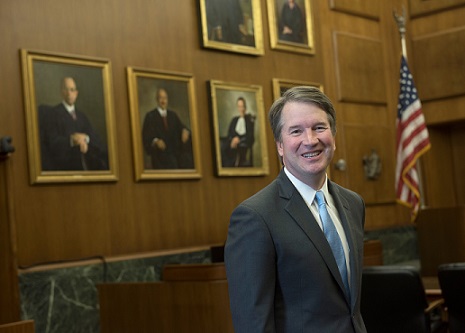Did Kavanaugh's 'one race' assertion signal a vote against racial preferences?

Judge Brett Kavanaugh. Photo by U.S. Court of Appeals for the District of Columbia Circuit.
Among 48 clerks hired by U.S. Supreme Court nominee Brett Kavanaugh while a circuit judge, 13 were minorities. This year, two of his clerks are African-American graduates of Yale Law School he recruited during annual visits in which he encouraged minorities to apply.
But the hiring record, reported by the National Law Journal, isn’t assuaging liberals’ concerns that he will vote to end racial preferences, the Washington Post reports.
Some point to a 1999 Wall Street Journal op-ed as evidence of his views. Kavanaugh, then a Kirkland & Ellis lawyer, was working on a case that claimed it was unconstitutional to bar people who weren’t native Hawaiians—defined as those of Polynesian origin—from voting for trustees of the Office of Hawaiian Affairs. Kavanaugh’s op-ed called Hawaii’s restrictions a “racial-spoils system.”
The op-ed quoted Justice Antonin Scalia’s concurrence in a case involving racial preferences in the hiring of government contractors. Scalia had argued the government can never have a compelling interest in racial preferences intended to make up for past discrimination.
“Under our Constitution there can be no such thing as either a creditor or a debtor race,” Scalia had written. “In the eyes of government, we are just one race here. It is American.”
The high court later struck down the Hawaii voting restriction in an opinion by Justice Anthony M. Kennedy. But Kennedy—whom Kavanaugh would replace—also provided the tiebreaking vote two years ago in a decision upholding a race-conscious admissions program at the University of Texas.
Vanita Gupta, president of the Leadership Conference on Civil and Human Rights, told the Post that Kavanaugh’s op-ed “really signals that he will bring an anti-civil-rights agenda to the Supreme Court.” According to Gupta, Kavanaugh “fails to recognize the current reality of being a person of color in this country and the history of discrimination.”
Supporters of affirmative action also are concerned about a 2012 opinion delaying for one year a voter ID law in South Carolina. Kavanaugh acknowledged that “racial insensitivity, racial bias, and indeed outright racism are still problems throughout the United States.”
But he nonetheless upheld the law over the objections of the Obama administration, which claimed a violation of Section 5 of the Voting Rights Act. The law put the burden on South Carolina to show the law wouldn’t abridge the right to vote.
Kavanaugh did not join a concurrence that said Section 5 had played a “vital function” that spurred legislators to make the law less restrictive.
See also:
ABA Journal: “Date announced for Supreme Court nominee Kavanaugh’s confirmation hearings.”
ABA Journal: “Kavanaugh memo in’98 urged independent counsel Starr not to pursue Clinton indictment while in office.”
ABA Journal: “Kavanaugh email shows offer to prepare ex-AG Ashcroft on attorney-client monitoring issue.”
ABA Journal: “ABA committee to evaluate Trump’s Supreme Court pick.”
ABA Journal: “Kavanaugh praised Rehnquist’s stand against unenumerated rights in Roe v. Wade dissent.”
ABA Journal: “Meet Brett Kavanaugh, Trump’s nominee for the Supreme Court.”



